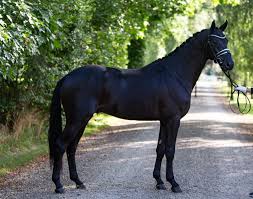
Trakehner
Conditions of detention
Trakehners require a stable or barn that provides adequate shelter from weather extremes. The stable should be well-ventilated, clean, and spacious enough to allow freedom of movement. Access to pasture or paddock space for regular exercise and grazing is essential for their well-being.
Useful Fact: Trakehners are intelligent and social animals that thrive on interaction and companionship. Providing regular turnout and opportunities for socializing with other horses is important for their mental health.
Nutrition and diet
A balanced diet for Trakehners includes high-quality hay, fresh pasture, and a balanced commercial grain or pelleted feed to meet their energy and nutritional needs. Their diet should be supplemented with vitamins and minerals as necessary, depending on their workload and lifestyle.
Useful Fact: Trakehners have varying nutritional requirements based on age, activity level, and metabolism. Monitoring their body condition and adjusting their diet accordingly helps maintain optimal health.
Health
Trakehners are generally healthy and robust horses but can be prone to certain health issues such as colic, lameness, and respiratory problems. Regular veterinary care, vaccinations, dental check-ups, and farrier visits are essential to maintaining their health.
Useful Fact: Trakehners benefit from regular exercise to maintain fitness and prevent health issues associated with a sedentary lifestyle. Providing a consistent exercise routine helps maintain their muscle tone and overall health.
Grooming and care
Regular grooming is essential for keeping a Trakehner’s coat and skin healthy. Daily brushing removes dirt and debris, stimulates circulation, and strengthens the bond between horse and handler. Regular cleaning of hooves and checking for any injuries or signs of lameness is also crucial.
Useful Fact: Trakehners often have sensitive skin, so using gentle grooming tools and products designed for sensitive horses can help prevent skin irritation.
Education and training
Trakehners are known for their intelligence and willingness to learn, making them highly trainable horses. They excel in various equestrian disciplines, including dressage, show jumping, and eventing. Consistent, positive reinforcement training methods work best.
Useful Fact: Trakehners are often chosen for competitive sports due to their athleticism and trainability. They respond well to skilled riders and trainers who can challenge them while providing clear guidance.
Toys and entertainment
While horses do not play with toys like pets, providing enrichment activities such as varied terrain, obstacles, and ground poles can keep Trakehners mentally stimulated. Access to pasture and interaction with other horses also provides entertainment and enrichment.
Useful Fact: Trakehners enjoy having an environment that allows them to explore and engage with their surroundings. Regular turnout in a varied environment encourages natural behaviors and prevents boredom.
Safety
Ensure that the living environment is free from hazards such as sharp objects, loose wires, and toxic plants. Fencing should be secure and regularly inspected to prevent injuries and escapes.
Useful Fact: Trakehners are curious and intelligent, so ensuring their environment is safe and stimulating helps prevent accidents and promotes well-being.
Accessories
Essential accessories for Trakehners include well-fitted tack, grooming supplies, and stable equipment. A properly fitted saddle and bridle are crucial for their comfort and performance during riding.
Useful Fact: Investing in high-quality, well-fitted tack is essential for preventing injuries and discomfort during training and competition.
Socialization
Trakehners are social animals that benefit from companionship with other horses. They often form strong bonds with their herd mates and enjoy social interactions in the pasture or stable.
Useful Fact: Providing opportunities for social interaction helps reduce stress and promotes a positive mental state for Trakehners.
Travel and Transportation
When transporting Trakehners, use a secure and well-ventilated horse trailer. Ensuring that the trailer is spacious enough for comfort and safety during travel is important.
Useful Fact: Acclimating Trakehners to the trailer before long journeys helps reduce stress and ensures a smooth transportation experience.
Behavior and psychology
Trakehners are known for their intelligence, sensitivity, and willingness to work. They require consistent handling and training to build trust and a strong bond with their handler.
Useful Fact: Understanding a Trakehner’s body language and behavior helps anticipate their needs and fosters a positive relationship between horse and rider.
Legal aspects
Owning a Trakehner involves legal responsibilities such as registration, health documentation, and compliance with local equine regulations. It is important to stay informed about any legal requirements related to horse ownership and management.
Useful Fact: Registering a Trakehner with the appropriate breed association ensures access to breed-specific resources and support.


